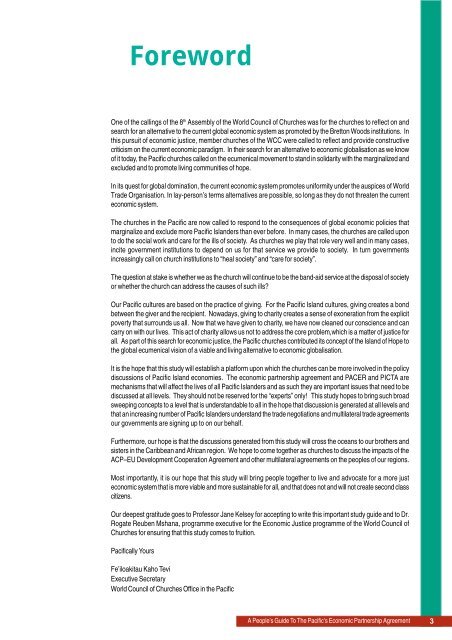REPA Booklet - Stop Epa
REPA Booklet - Stop Epa
REPA Booklet - Stop Epa
Create successful ePaper yourself
Turn your PDF publications into a flip-book with our unique Google optimized e-Paper software.
Foreword<br />
One of the callings of the 8 th Assembly of the World Council of Churches was for the churches to reflect on and<br />
search for an alternative to the current global economic system as promoted by the Bretton Woods institutions. In<br />
this pursuit of economic justice, member churches of the WCC were called to reflect and provide constructive<br />
criticism on the current economic paradigm. In their search for an alternative to economic globalisation as we know<br />
of it today, the Pacific churches called on the ecumenical movement to stand in solidarity with the marginalized and<br />
excluded and to promote living communities of hope.<br />
In its quest for global domination, the current economic system promotes uniformity under the auspices of World<br />
Trade Organisation. In lay-person’s terms alternatives are possible, so long as they do not threaten the current<br />
economic system.<br />
The churches in the Pacific are now called to respond to the consequences of global economic policies that<br />
marginalize and exclude more Pacific Islanders than ever before. In many cases, the churches are called upon<br />
to do the social work and care for the ills of society. As churches we play that role very well and in many cases,<br />
incite government institutions to depend on us for that service we provide to society. In turn governments<br />
increasingly call on church institutions to “heal society” and “care for society”.<br />
The question at stake is whether we as the church will continue to be the band-aid service at the disposal of society<br />
or whether the church can address the causes of such ills?<br />
Our Pacific cultures are based on the practice of giving. For the Pacific Island cultures, giving creates a bond<br />
between the giver and the recipient. Nowadays, giving to charity creates a sense of exoneration from the explicit<br />
poverty that surrounds us all. Now that we have given to charity, we have now cleaned our conscience and can<br />
carry on with our lives. This act of charity allows us not to address the core problem,which is a matter of justice for<br />
all. As part of this search for economic justice, the Pacific churches contributed its concept of the Island of Hope to<br />
the global ecumenical vision of a viable and living alternative to economic globalisation.<br />
It is the hope that this study will establish a platform upon which the churches can be more involved in the policy<br />
discussions of Pacific Island economies. The economic partnership agreement and PACER and PICTA are<br />
mechanisms that will affect the lives of all Pacific Islanders and as such they are important issues that need to be<br />
discussed at all levels. They should not be reserved for the “experts” only! This study hopes to bring such broad<br />
sweeping concepts to a level that is understandable to all in the hope that discussion is generated at all levels and<br />
that an increasing number of Pacific Islanders understand the trade negotiations and multilateral trade agreements<br />
our governments are signing up to on our behalf.<br />
Furthermore, our hope is that the discussions generated from this study will cross the oceans to our brothers and<br />
sisters in the Caribbean and African region. We hope to come together as churches to discuss the impacts of the<br />
ACP–EU Development Cooperation Agreement and other multilateral agreements on the peoples of our regions.<br />
Most importantly, it is our hope that this study will bring people together to live and advocate for a more just<br />
economic system that is more viable and more sustainable for all, and that does not and will not create second class<br />
citizens.<br />
Our deepest gratitude goes to Professor Jane Kelsey for accepting to write this important study guide and to Dr.<br />
Rogate Reuben Mshana, programme executive for the Economic Justice programme of the World Council of<br />
Churches for ensuring that this study comes to fruition.<br />
Pacifically Yours<br />
Fe’iloakitau Kaho Tevi<br />
Executive Secretary<br />
World Council of Churches Office in the Pacific<br />
A People’s Guide To The Pacific’s Economic Partnership Agreement 3
















